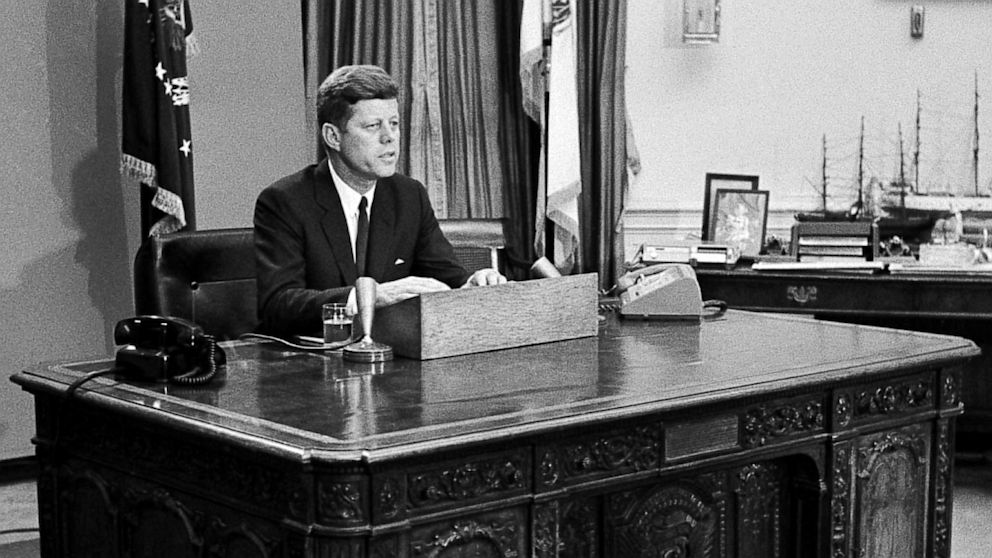5 Headlines That Would Have Been If JFK Lived
Alternate history theorists wonder what could have been if Kennedy had survived.

Nov. 13, 2013 -- intro: There is little debate among historians that on a clear Dallas morning in November 1963, when President John F. Kennedy was struck down by an assassin's bullet, the course of history was altered forever.
Open for discussion, however, is what might have happened if Kennedy had lived.
For the last 50 years, writers and scholars have penned "alternate histories," dreaming up a world in which the 35th president survived the attempt on his life.
"If we ask the right questions about what might have been, we can learn important lessons -- not only how 'contingent' history is, but also what kind of qualities we want and need in the leaders we choose," political analyst Jeff Greenfield, himself an author of one of those parallel universe books, recently wrote in The Dallas Morning News.
What would have changed if that fateful day in Dallas had never come to pass? Here are five headlines that never were -- but could have been:
Watch archival footage from the day of JFK's assasination.
quicklist:title:'KENNEDY WITHDRAWS FORCES FROM VIETNAM'text: Koji Masutani's 2008 documentary, "Virtual JFK: Vietnam If Kennedy Had Lived," draws from Kennedy's past crisis responses (such as the Bay of Pigs, the Cuban Missile Crisis, and the construction of the Berlin Wall) to argue that the Vietnam War would not have dragged on if JFK had lived.
Kennedy had already started to draw down his military advisers when he was killed, and he had directed his Secretary of Defense Robert McNamara to plan a systematic removal of U.S. forces from Vietnam by 1965.
Masutani's film posits that it was Johnson who escalated the conflict to the point of war. As Johnson once said, "I don't think negotiation is necessarily the best way to win the girl."
quicklist:title:'JFK MOVES TOWARD ACCOMMODATION WITH CUBA'text: Robert Dallek, a recently retired history professor, even believes that Kennedy's move away from military action could have extended to Cuba as well.
In "JFK's Second Term," published in The Atlantic in June 2003, Dallek draws from JFK's frustrating meetings with his military advisers to argue that Kennedy was slowly approaching accommodation with Cuba and its dictator Fidel Castro.
Kennedy had battled with his military counsel on the issue, particularly NATO Commander General Lauris Norstad and Air Force Chief of Staff General Curtis LeMay, who believed the U.S. may have to resort to atomic action.
Kennedy reportedly told his aide Kenneth O'Donnell, "These brass hats have one great advantage in their favor. If we listen to them, and do what they want us to do, none of us will be alive later to tell them that they were wrong."
The president appeared to distrust his military advisors -- particularly after the disastrous Bay of Pigs invasion -- and appeared to be taking their advice less and less into consideration.
As Kennedy later told Benjamin Bradlee, then the Washington bureau chief for Newsweek, "The first advice I'm going to give my successor is to watch the generals and to avoid feeling that just because they were military men their opinions on military matters were worth a damn."
quicklist:title:'KENNEDY PUBLICLY CONFRONTS PERSONAL SCANDAL'text: Many forget that the 35th president's extramarital activities almost came to public light a few weeks before he was killed. His brother and Attorney General Robert Kennedy worked hard to keep them out of the press.
In his book "If Kennedy Lived: The First And Second Terms Of President John F. Kennedy: An Alternate History," journalist and political analyst Jeff Greenfield argues that JFK may have had to confront these allegations if he had lived.
"My book suggests that John and Robert Kennedy would have used all the powers at their disposal to keep the scandal from taking root," Greenfield wrote in The Dallas Morning News.
And Lyndon Johnson could have suffered a much worse historical fate had JFK lived. At the time of the assassination, Johnson was facing two serious allegations: one from a Senate committee that he had taken kickbacks and another from Life magazine that he had earned his fortune in a less than civil manner as a public servant.
These investigations ended when Johnson was sworn in to replace Kennedy: "No one wanted to inject more trauma into an already shocked and shaken nation," Greenfield wrote.
quicklist:title:'GEORGE WALLACE WINS 1968 ELECTION'text: In Stephen King's 2011 novel 11/22/63, time-traveling protagonist Jake Epping distracts Lee Harvey Oswald and saves President Kennedy from his bullet -- but it is largely for naught.
King writes that after JFK's re-election, the Civil Rights Act never passed. Because of this, George Wallace was elected president in 1968. (Wallace was the pro-segregation governor of Alabama who pronounced, "I say segregation now, segregation tomorrow, segregation forever.")
In King's fiction world, Wallace raised the conflict in Vietnam to nuclear proportions that triggered a domino effect with wars around the world, creating an atomic dystopia.
quicklist:title:'GEORGE W. BUSH LOSES 2000 ELECTION'text: Could the effect of Kennedy's death have reverberated into 21st century politics? Princeton history professor Sean Wilentz suggested so in his November 2003 editorial, "What If Kennedy Had Lived?"
According to Wilentz, the conservative support that brought George W. Bush to the White House in 2001 had its roots in the 1968 presidential victory of Richard Nixon. "With Kennedy dead, Nixon won the White House by following a Southern strategy that inflamed the reaction against Johnson's Great Society programs and exploited the national divisions over Vietnam," Wilentz wrote.
The Princeton professor argues that the "consolidation of the hard-line Southern Republican conservatism" that Nixon began secured the election wins of both Ronald Reagan and George W. Bush.
"Kennedy's death changed everything," Wilentz concluded.



